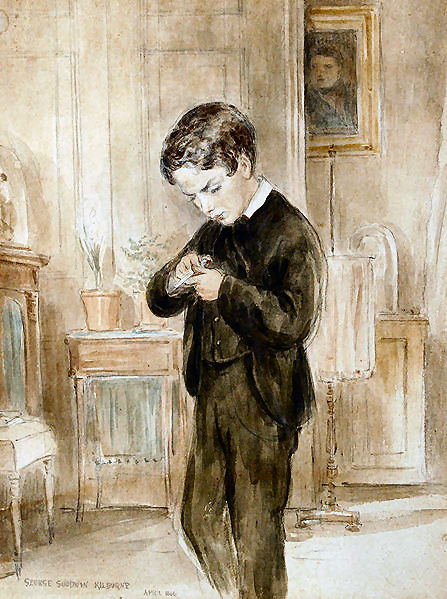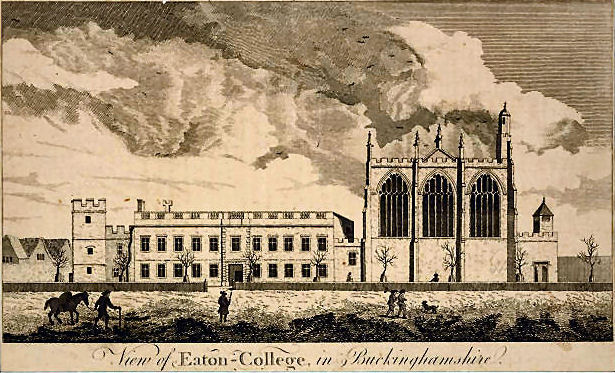
Eton College – its elite status, educational attributes and vast complex of historic buildings, founded by Henry VI over five hundred years ago, are world famous and so is a certain question, asked again and again?
Here is the BBC asking that question in 2010 when David Cameron was elected prime minister. “David Cameron has become the 19th prime minister of Great Britain to have attended Eton College near Windsor. Why have so many leaders come from this one school?” (BBC Radio 4’s The World Tonight Wednesday, 12 May 2010).
One key opinion, voiced in their programme was, that despite its Victorian-era uniform, and rules dating back through the centuries and a perception of Eton as a rigid, conformist institution, “Eton also allows a degree of dissent and, to a certain extent, encourages it. That’s very helpful to anyone who wants a leadership role.” (Palash Dave speaking on BBC Radio 4’s The World Tonight Wednesday, 12 May 2010).
Hidden in its past, and way before the Victorian-era uniform, certain kinds of dissent were certainly encouraged and this blog recalls a particularly tragic episode that, reading between the lines, may go some way to answering the BBC’s question. This was the Eton of 1825 and the Eton ruled by the legendary disciplinarian headmaster, Dr. Keate.
At this time in the history of Eton College, there was a great deal of scandal concerning the standard and conditions of teaching at the school. Discipline was a major problem with the pupils often left to their own devices, especially at night when they were locked in their dormitory. Dr. Keate, whose reputation for flogging the pupils was legendary, was also known for wearing was described by a contemporary as ‘fancy dress, partly resembling the costume of Napoleon and partly that of a widow woman.’
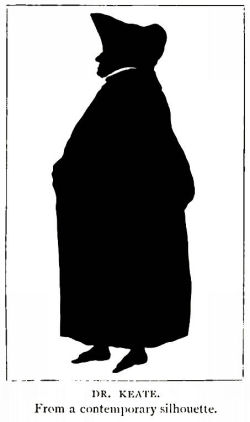
Dr. Keate’s mission was to bring order and discipline to the boys in his care. He took it upon himself to teach from one hundred to two hundred boys at any one time, using the spacious upper school as one massive classroom.
On Sunday, 27th February, 1825, around two o-clock in the afternoon, an altercation took place in the school playing fields between two boys. Because we are talking about Eton, the intricacies of social class, family pedigrees and notions of honour rise to the fore, whereas two village boys fighting on the common would be ignored.
Here we have the Honorable Ashley Cooper, son of the Earl of Shaftesbury, and Charles Alexander Wood, son of Colonel Wood and the nephew of the Marquis of Londonderry. It is not clear what insults were being traded but they soon led to blows being exchanged. Although both lads were nearly fifteen years old, Wood was much bigger than Cooper.
They fought five minutes or so until the school captain was summoned to deal with them. In the Eton tradition, it was decided that they should meet the following afternoon for an agreed pugilistic contest to settle their differences.
At this time, boxing was a sport with rules laid down in 1743 by a certain James Broughton. Fights were with bare knuckles and each round lasted until one fighter was knocked down. The fight ended only when one of the opponents fell to the ground and failed to get up within thirty seconds. Broughton’s rules were tough, but then so was an Eton education.
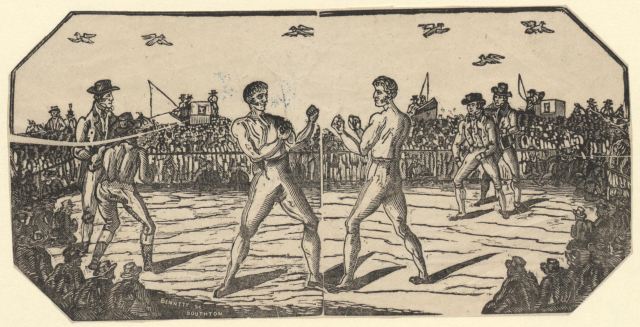
BROUGHTON RULES: BARE-KNUCKLE BOXING MATCH (WOOD ENGRAVING CIRCA 1830)
On Monday, 28th February, at four o’clock in the afternoon, in front of a large crowd of cheering, jeering and shouting boys, the combatants stripped to the waist and began fighting. The smaller boy, Cooper was very agile and, shouting that he would never give in and the honour of his family was at stake, he fought hard against the much taller Wood.
As Cooper fell and then got up again, the rounds were counted and when they reached ten, it was clear that Cooper was in considerable distress. Both fighters had boys acting as ‘seconds’ and they had brought large quantities of brandy with them for ‘medical assistance.’
By the eleventh round, Cooper’s ‘second’ Alexander Wellesley Leith, a senior pupil, began pouring large measures of brandy down Cooper’s throat, which did revive him, albeit briefly. However, Cooper was repeatedly struck on the head by Wood, one heavy blow in particular hit his temple and Cooper collapsed in agony.
Wood’s supporters cheered, proclaiming their man the better fighter, but Cooper was revived once more by Leith and the fight continued. It had begun at four o’clock and now two hours later, they were still attempting to fight – both of them utterly exhausted.
Wood who had the physical advantage from the start, was not at all badly off compared with Cooper who was unable to focus or move with any degree of precision. Each time a round was declared, they would both be plied with more brandy.
At one point, rather bizarrely, Wood declared he had to attend a tutorial with his tutor, Mr. Ottery and so would continue the fight with Cooper later. Cooper’s ‘second’ Leith, said they should go another round as the fight had not been concluded. He appealed to Cooper’s ‘second’ who declared , “We will have another round, we are in no hurry.”
And so they continued. In that round, Wood struck a severe blow to Cooper that not only felled him, but Wood also toppled with the exertion and collapsed heavily on top of him.
Some reports claim that the boys fought an astonishing sixty rounds before it was finally over for Cooper who crashed to the ground and lay quite still. Leith now insisted they made up their differences on the spot. Wood lifted Cooper’s head but seeing he was knocked senseless, said nothing and left the scene of the fight with his supporters.
Cooper had two brothers at the college. They picked him up and carried him to his lodgings at the house of the Reverend Knapp, where they put him straight to bed. One of Cooper’s brothers stayed by his bedside, but it was four hours before any medical advice was sought.
By the time a doctor did arrive, Cooper was dead. The Coroner and his jury all visited the deceased boy at the Rev. Knapp’s house on Tuesday March 1st at two o’clock in the afteroon. They found Cooper’s temples, eyes, and the upper part of his cheek bones were jet black with bruises and many of his face bones were broken. His ribs and breast were severely damaged. When the autopsy took place, it was found that he had sustained a rupture of the blood vessels in the brain.
The police were informed, and it was decided that Cooper had been unlawfully killed and that both Wood and Leith should be indicted for his slaying.
We do not know what Dr. Keate had to say about this tragic episode involving his boys, but he had organised some unusual legal arrangements on behalf of Charles Wood. At a somber roll call on the morning of Wednesday 2nd March, the pupils answered to their names in the traditional manner. All were conscious of the fact that one name would never be called again. The Honorable Ashley Cooper had been literally struck from the register. When Alexander Wellseley Leith’s name was called, there was silence. He was absent, and others offered the information that his family had withdrawn him from the college. So Leith, Cooper’s enthusiastic ‘second’ in the fight, had been spirited away.
However, when the name of Cooper’s opponent was called, Charles Alexander Wood answered in the affirmative. He was immediately advised that he must consider himself in custody, but special arrangements had been made to keep him from being sent to the county gaol.
He was to remain in the college, living at his tutor’s house, together with a police officer, who would accompany him at all times. It seems that Dr. Keates’s view was that, as Cooper’s death occurred on college grounds in what he chose to call an ‘honourable settlement of differences’, the immediate requirements of the law could be accommodated within his personal jurisdiction. Now we begin to see the so-called ‘Eton factor’ sought by the BBC coming into play, for Cooper’s father, the Earl of Shaftesbury, had agreed with this arrangement.
His son’s funeral was to be that Sunday at the college chapel, so he did not wish to pursue an indictment against Charles Wood and Alexander Leith at that time but to leave them cited on the coroner’s warrant as having unlawfully killed his son. He knew an indictment for Manslaughter would follow in due course.
The Morning Chronicle in reporting the funeral and Wood’s interment in a vault in the isle of the college chapel beneath the organ loft, expressed surprise that none of Wood’s family were present, “not even his Noble father.”
They went on to say, “The students crowded round the vault in which the body of their late associate was enclosed for ever.” (Morning Chronicle March 7th, 1825). Even in letters to the press about the event, we see the ‘Eton-factor’ whereby Eton is seen as a place for leaders rather than followers and so more care should be taken to protect them for themselves and provide role models for the ‘inferior’ classes, for example:
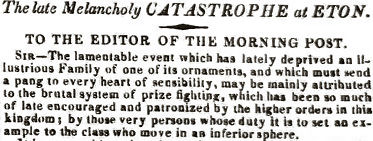 On Wednesday, 9th March, 1825, Wood aged fifteen and Leith aged seventeen, appeared at Aylesbury Assizes, charged with the ‘killing and slaying’ of Cooper, but they were not alone in the dock!
On Wednesday, 9th March, 1825, Wood aged fifteen and Leith aged seventeen, appeared at Aylesbury Assizes, charged with the ‘killing and slaying’ of Cooper, but they were not alone in the dock!
With them as ‘friends’ were Lord Charles Fitzroy, Lord Nugent, Colonel Brown, Colonel Wood, Sir John Dashwood King, (the County Magistrate) Mr. Rickford, M.P., the Rev. Edward Craven Hawkey, and the Rev. Okes and the tutors of the accused; around twenty students of Eton and several other, ‘gentlemen of distinction’, all linked together as ‘Etonians.’
The charges were read:
“You Charles Alexander Wood, Gent., stand indicted for having, on the 28th February last, in the Parish of Eton, in this County, unlawfully and feloniously assaulted the Honorable Francis Ashley Cooper, and that you, Charles Alexander Wood, with both your hands, did beat the said Honorable F.A. Cooper on the head, and strike him to the ground, and did thereby cause the rupture of a large blood-vessel, of which mortal wound he died; and you, Alexander Wellesley Leith, was then and there present, and did the said Charles Alexander Wood comfort and assist in the felony and manslaughter of which he stands charged – Are you guilty or not-guilty?”
The prisoners replied, “Not Guilty.”
This is the moment in all trial procedures that the prosecution would rise and begin their case, calling witnesses to prove the authenticity of the charges made. Moments passed, and the judge, Justice Gazelee waited patiently, but no-one rose. The promised prosecution witnesses were not there. It was remarked on by the judge as very unusual that the three named witnesses for the prosecution, charged on a Coroner’s inquest to attend and give evidence, found themselves unable to be present in court. Information about mysterious and sudden ‘changes of heart’ by the prosecution witnesses was passed to the judge.
In an attempt to continue with the case, the judge ordered the following proclamation to be read out by the Officer of the Court:
“If any one can inform my Lord the King’s Justices of any murders, treasons, felonies, or misdemeanors etc. done by the prisoners at the bar, or either of them, let them come forward and give evidence.”
Silence, no one moved. Justice Gazelee spoke with incredulity;
“Does no Gentleman appear to prosecute?”
The Officer of the Court replied:
“No Gentleman at the Bar is instructed my Lord.”
The judge quickly commanded that the constable of Eton, Christopher Teasdale, who had guarded Wood, be instructed to give evidence.
The constable was called – but did not appear despite having being subpoenaed to attend the trial by the Coroner, but when further questioned by the judge, the Coroner could not confirm that the constable had been given the subpoena as he chose not deliver it in person and had left it to another to deal with. Other names were called who had been subpoenaed by the Coroner to attend and give evidence – none were present.
Mr. Justice Gazelee had no option left but to say to the jury, “It is my duty to state to you, that as no evidence has been called to support the charge, they are entitled to an acquittal and you will say they are Not Guilty.” The jury instantly acquitted them as instructed.
The two boys bowed to the judge and immediately left the dock with their ‘friends’.
What was that BBC question again?
“Why have so many leaders come from this one school?”
A puzzle indeed!
